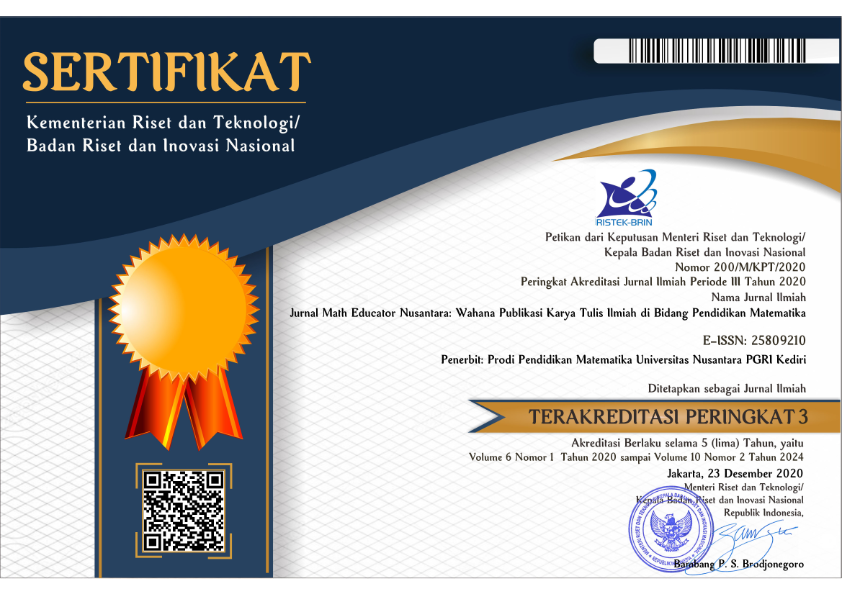Development of hands on mathematics module based on journal review to promote student involvement in merdeka curriculum
DOI:
https://doi.org/10.29407/jmen.v9i2.21181Keywords:
Hands on mathematics, Merdeka Curriculum, mathematics activity, mathematics games, mathematics aid teachingAbstract
The massive development of technology in education has led to the implementation of digital-based learning. However, the impact of the pandemic and the implementation of online learning by utilizing digital technology has caused problems in the form of learning loss. The Merdeka Curriculum as an effort to resolve this learning loss has actually created new problems, that is, teachers' difficulties in implementing differentiated, fun, and meaningful student-centered learning. More specifically, this difficulty occurs for math teachers who do not have references to various mathematics activities that support meaningful learning. One alternative solution to solve this problem is to have a special module that contains references to various mathematical activities and games. The purpose of this research is to develop a hands-on mathematics module based on journal studies which becomes a teaching module in the manipulative mathematics media course. The research and development model to be implemented is 4D Thiagarajan which consists of 4 stages, these stages are define, design and develop. The dissemination stage was not carried out in this period due to research limitations. The results showed that the developed module met the validity criteria with a score of 2.71, met the practicality criteria with a score of 87% and met the effectiveness criteria with a score of 91,6. It’s concluded that the hands on mathematics module was feasible to use and met the criteria of valid, practical, and effective. The results of the study are expected to be a recommendation for further development research and for teachers in designing mathematics learning.
References
Andriani, W., Subandowo, M., Karyono, H., & Gunawan, W. (2021). Learning loss dalam pembelajaran daring di masa pandemi corona. Seminar Nasional Teknologi Pembelajaran, 1(1), 484–501.
Ariza Muñoz, E. del C., González-Calero, J. A., de Oro Aguado, C. M., & Cózar-Gutiérrez, R. (2023). Colombian future teachers’ beliefs about mathematics and its learning. International Journal of Mathematical Education in Science and Technology, 54(8), 1474–1489. https://doi.org/10.1080/0020739X.2023.2170834
Budiyanto, C., Fitriyaningsih, R. N., Kamal, F., Ariyuana, R., & Efendi, A. (2020). Hands-on Learning In STEM: Revisiting Educational Robotics as a Learning Style Precursor. Open Engineering, 10(1), 649–657. https://doi.org/10.1515/eng-2020-0071
Coskun Karabulut, H., Elcan kaynak, N., & Kariper, I. A. (2023). Pre service teachers’ engagement with stem-based hands-on activities in online chemistry laboratory courses. Research in Science & Technological Education, 1–21. https://doi.org/10.1080/02635143.2023.2215170
Gravett, S., & van der Merwe, D. (2023). Learning-centered lesson design and learning about teaching in a pre-service teacher education course. Cogent Education, 10(1), 2202123. https://doi.org/10.1080/2331186X.2023.2202123
Jojor, A., & Sihotang, H. (2022). Analisis Kurikulum Merdeka dalam Mengatasi Learning Loss di Masa Pandemi Covid-19 (Analisis Studi Kasus Kebijakan Pendidikan). Edukatif : Jurnal Ilmu Pendidikan, 4(4), Article 4. https://doi.org/10.31004/edukatif.v4i4.3106
Khairunnisa, G. F., & Ilmi, Y. I. N. (2020). Media pembelajaran matematika konkret versus digital: Systematic literature review di era revolusi industri 4.0. Jurnal Tadris Matematika, 3(2), 131–140.
Kurniati, L., & Kusumawati, R. (2023). Analisis Kesiapan Guru SMP Di Demak Dalam Penerapan Kurikulum Merdeka. Jurnal Cakrawala Ilmiah, 2(6), Article 6. https://doi.org/10.53625/jcijurnalcakrawalailmiah.v2i6.5031
Kurniawan, N. A., & Wardhani, P. C. (2021). Tren Digitalisasi Pendidikan Di Indonesia Pasca Pandemi Covid-19. Seminar Nasional Peta Jalan Pendidikan dan Rancangan Undang-Undang Sistem Pendidikan Nasional, 1(1), Article 1. http://conference.um.ac.id/index.php/snpjp/article/view/1822
Maksum, A., & Fitria, H. (2021). Tranformasi dan Digitalisasi Pendidikan Dimasa Pandemi. Prosiding Seminar Nasional Program Pascasarjana Universitas PGRI Palembang.
manggalastawa, M. (2023). Analysis Of Differentiated Learning In Mathematics Lessons For The Independent Curriculum In Elementary School. Jurnal Analisis Ilmu Pendidikan Dasar, 4(1), 34–40.
Mardati, A. (2021). Media Digital Dalam Pembelajaran Matematika. Prosiding Seminar Nasional Dies Natalis UTP Surakarta, 1(01), Article 01. https://doi.org/10.36728/semnasutp.v1i01.25
Moyer-Packenham, P. S., Lommatsch, C. W., Litster, K., Ashby, J., Bullock, E. K., Roxburgh, A. L., Shumway, J. F., Speed, E., Covington, B., Hartmann, C., Clarke-Midura, J., Skaria, J., Westenskow, A., MacDonald, B., Symanzik, J., & Jordan, K. (2019). How design features in digital math games support learning and mathematics connections. Computers in Human Behavior, 91, 316–332. https://doi.org/10.1016/j.chb.2018.09.036
Pan, Yanjun, Ke, Fengfeng, & Xu, Xinhao. (2022). A systematic review of the role of learning games in fostering mathematics education in K-12 settings. Educational Research Review, 36, 100448. https://doi.org/10.1016/j.edurev.2022.100448
Putra, F. G. (2017). Eksperimentasi Pendekatan Kontekstual Berbantuan Hands On Activity (HoA) Terhadap Kemampuan Pemecahan Masalah Matematik. Al-Jabar : Jurnal Pendidikan Matematika, 8(1), Article 1. https://doi.org/10.24042/ajpm.v8i1.1148
Şahin, Ö., & Danaci, D. (2022). Investigating the effect of history-of-mathematics activities on middle-grade students’ mental computation and opinions: An action research. International Journal of Mathematical Education in Science and Technology, 53(9), 2281–2318. https://doi.org/10.1080/0020739X.2020.1857859
Santia, I., Handayani, A. D., Hima, L. R., & Nurfahrudianto, A. (2022). Development inovatif statistic e-modul based multiple representation. Jurnal Math Educator Nusantara: Wahana Publikasi Karya Tulis Ilmiah Di Bidang Pendidikan Matematika, 8(2), 147-154. https://doi.org/10.29407/jmen.v8i2.18664
Seage, S. J., & Türegün, M. (2019). The Effects of Blended Learning on STEM Achievement of Elementary School Students. International Journal of Research in Education and Science, 6(1), 133. https://doi.org/10.46328/ijres.v6i1.728
Setyowati, N., & Mawardi, M. (2018). Sinergi Project Based Learning dan Pembelajaran Bermakna untuk Meningkatkan Hasil Belajar Matematika. Scholaria: Jurnal Pendidikan Dan Kebudayaan, 8(3), 253–263.
Suriani, T., & Z, Y. R. (2022). Pengaruh Model Pembelajaran Kooperatif Tipe STAD Melalui Teknik Hands On Mathematics Berbantuan LKS Terhadap Pemahaman Konsep Dan Pemecahan Masalah. EduMatSains : Jurnal Pendidikan, Matematika dan Sains, 7(1), Article 1. https://doi.org/10.33541/edumatsains.v7i1.3941
Throop Robinson, E., McKee, L., & Orr, A. (2022). Hands-On Mathematics: Preservice Teachers Supporting Home Learning During COVID-19 (pp. 371–393). https://doi.org/10.1007/978-3-030-96977-6_19
Van Katwijk, L., Jansen, E., & Van Veen, K. (2023). Pre-service teacher research: A way to future-proof teachers? European Journal of Teacher Education, 46(3), 435–455. https://doi.org/10.1080/02619768.2021.1928070
Downloads
Published
Issue
Section
License
Authors who publish with this journal agree to the following terms:
- Copyright on any article is retained by the author(s).
- The author grants the journal, the right of first publication with the work simultaneously licensed under a Creative Commons Attribution License that allows others to share the work with an acknowledgment of the work’s authorship and initial publication in this journal.
- Authors are able to enter into separate, additional contractual arrangements for the non-exclusive distribution of the journal’s published version of the work (e.g., post it to an institutional repository or publish it in a book), with an acknowledgment of its initial publication in this journal.
- Authors are permitted and encouraged to post their work online (e.g., in institutional repositories or on their website) prior to and during the submission process, as it can lead to productive exchanges, as well as earlier and greater citation of published work.
- The article and any associated published material is distributed under the Creative Commons Attribution-ShareAlike 4.0 International License













